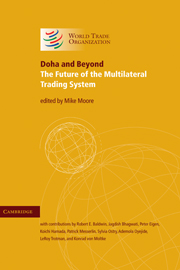Book contents
- Frontmatter
- Contents
- List of contributors
- Introduction
- 1 Trade and sustainable development in the Doha Round
- 2 The WTO: the institutional contradictions
- 3 China's entry into the WTO and its impact on the global economic system
- 4 Key challenges facing the WTO
- 5 Development dimensions in multilateral trade negotiations
- 6 External transparency: the policy process at the national level of the two-level game
- 7 Trading for development: how to assist poor countries
- 8 Controlling corruption: a key to development-oriented trade
- 9 The impact of EC enlargement on the WTO
- Index
7 - Trading for development: how to assist poor countries
Published online by Cambridge University Press: 05 August 2012
- Frontmatter
- Contents
- List of contributors
- Introduction
- 1 Trade and sustainable development in the Doha Round
- 2 The WTO: the institutional contradictions
- 3 China's entry into the WTO and its impact on the global economic system
- 4 Key challenges facing the WTO
- 5 Development dimensions in multilateral trade negotiations
- 6 External transparency: the policy process at the national level of the two-level game
- 7 Trading for development: how to assist poor countries
- 8 Controlling corruption: a key to development-oriented trade
- 9 The impact of EC enlargement on the WTO
- Index
Summary
Introduction
The launch of a new Round of multilateral trade negotiations (MTN) at Doha dealt a needed blow to the anti-globalizers who had triumphed at Seattle just two years before. But it was important for a different reason as well. The word ‘Development’ now unconventionally graces the name of the new Round, alongside Doha. Development of the poor countries will be the central objective of the new Round.
But pleasing rhetoric aside, we must ask: what does this mean? The question is not an idle one. For, if the current thinking in policy and NGO circles on what is the appropriate answer is any guide to what is in store for the poor countries, there is cause for alarm.
Of course, the proponents of trade have always considered that trade is the policy and development is the objective. The post-war experience only proves them right. The objections advanced by a handful of dissenting economists, claiming that free traders exaggerate the gains from trade or forget that good trade policy is best embedded within a package of reforms, mostly set up and knock down straw men, or aunt sallies, depending on your gender preference. Consider just the most insidious ones.
A currently fashionable argument is that trade is only a component of a package of good policies. Sure enough. But it requires either amnesia or ignorance, and focus on an occasional overenthusiast such as my Columbia University colleague Jeffrey Sachs, whose enthusiasm often strains credulity, to argue that the proponents of freer trade believe in monocausality in explaining good or bad economic outcomes.
- Type
- Chapter
- Information
- Doha and BeyondThe Future of the Multilateral Trading System, pp. 115 - 124Publisher: Cambridge University PressPrint publication year: 2004

